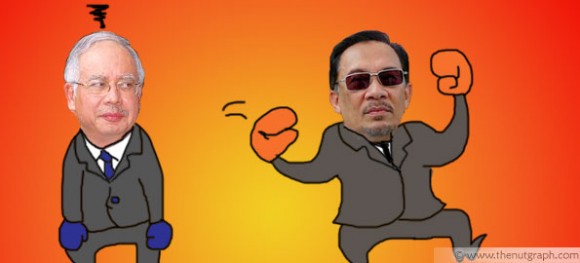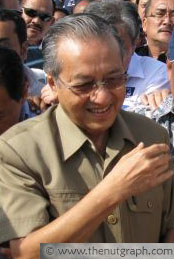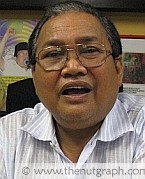DISAPPOINTING as the Datuk Seri Dr Chua Soi Lek-Lim Guan Eng televised debate was, what’s clear is this: Malaysia could do with more public debates between the politicians who covet our votes and the power of public office.
Since the 18 Feb 2012 debate between the MCA president and the DAP secretary-general, calls have been made for more debates between political opponents from the Barisan Nasional (BN) and Pakatan Rakyat. Among the strongest calls have been for a debate between Prime Minister Datuk Seri Najib Razak and Opposition Leader Datuk Seri Anwar Ibrahim. Yet, while other BN component parties have declared and even shown willingness to public debates, there seems to be great reluctance from within Umno for Najib to take on Anwar.

The question is, why? Since it is generally accepted that public debates between politicians is one reflection of a seasoned democracy and mature politicians, what could be the possible reasons for Najib not wanting to debate Anwar publicly?
“No need to debate”
So far, the reasons that have been proffered by two former prime ministers against holding such a debate have come across as being indefensible excuses.
Tun Abdullah Ahmad Badawi has said debates “don’t decide the election” and don’t “solve problems”. “What is more important is that the government is able to contribute to the people through implementation of programmes,” he told reporters.

It’s true that public debates are not likely to solve the nation’s issues. But is that the purpose of a public debate? I doubt that anyone wanting to watch a public debate between politicians expect it to be anything except one way to assess a candidate and be convinced of his or her ability to lead.
And actually, public debates can decide an election. Just look at, for example, the presidential candidate debates within the Republican and Democratic parties in the US. In the Republican presidential debate, once-popular Rick Perry blew his chance at being the party’s presidential candidate when he struggled to remember the third government agency he would get rid of should he come into office. The three-time Texas governor saw his poll figures fall from as high as 38% to single digit lows after he “stumbled and bumbled” through a string of Republican debates at the end of last year.
Is that what Najib’s office is afraid of? That Najib won’t fare well against Anwar, the skilled orator? Or that Najib would see his popularity ratings fall should he not be as scintillating as Anwar during a public debate?

In a way, former premier Tun Dr Mahathir Mohamad speaks candidly when he objected to the Najib-Anwar debate and said that such debates, even in the US, sometimes showed “how stupid” leaders were. That is true. And my question is, isn’t it useful and advantageous for the rakyat to know “how stupid” a leader is before we decide to support him or her? Isn’t it in the US citizens’ interest, for example, that they now know that Perry would not actually make an able president despite the fact that he was a very popular Texas governor and handsome to boot?
Is Najib afraid he will look stupid? Is that what Dr Mahathir is saying about the calibre of the current Umno leadership? If Najib isn’t afraid of looking stupid, then what’s stopping him from debating Anwar publicly?
Dr Mahathir also said it was pointless to debate Anwar because his former deputy prime minister was a “chameleon” who spoke a different message to different audiences. Notwithstanding the accuracy of that generalisation, the same observation could be made of Najib. At the Vatican last year, where he met the Pope to cement diplomatic relations, Najib was for certain not issuing conditions for respecting Christians in the same way that he did upon his return to Malaysia.
Then there was the excuse from Cheras Umno division chief Datuk Syed Ali Alhabshee who said Najib should not debate Anwar on national economic issues because the Opposition Leader was not an economic expert. If I remember correctly, it was Umno that appointed Anwar as finance minister until he was sacked on corruption and sodomy charges. So if Anwar is not an economic expert, doesn’t that mean that Umno cannot be trusted to appoint the right person to a cabinet portfolio? What, then, is Umno’s criteria in making cabinet appointments?

Not to be outdone, Perkasa chief, Datuk Ibrahim Ali, has said Anwar does not have “the moral standing” to debate the prime minister. One wonders, just how high is Najib’s moral standing when the murder of a Mongolian translator, whose name must not be mentioned, continues to shadow the premier.
Missing the point
Then there’s the suggestion from Umno secretary-general Tengku Adnan Tengku Mansor that Najib has “more important matters” to attend to than debate with Anwar. Imagine President Barack Obama saying he had “more important matters” to attend to than engage in a public debate with his political opponent. Clearly, the Malaysian premier is just busier than the US president.
Tengku Adnan added that if Anwar were interested in debating, he would gladly organise for the Opposition Leader to debate with his former aide and accuser in his sodomy II trial, Mohd Saiful Bukhari Azlan. Surely, an Umno veteran should know better than to be facetious. Or could it be that the Umno veteran is just completely missing the point?

Saiful Bukhari, unlike Najib, is not an elected representative. He is not vying for public office. And he is not, to the public’s knowledge, contesting to become prime minister. Najib wants to remain premier and Anwar wants to become Malaysia’s numero uno, and as Opposition Leader must be considered a potential prime-minister-in-waiting in a democracy. I suspect Tengku Adnan was attempting to insult Anwar. And the truth is he instead ended up insulting the prime minister’s office by making Saiful comparable to Najib.
Protecting Najib
What do these excuses tell us? Apart from the fact that they’re illogical, it would seem that Umno is taking great pains to protect Najib from a debate with Anwar. And that could be for a number of reasons.
One, that Umno has poor understanding and respect for the office of the Opposition Leader in a parliamentary democracy. Two, that Umno believes Najib does not need to be even more accountable to public queries through a public debate. Three, that Umno knows that it does not need any additional public platform since the BN already controls most of the media. Or four, that Najib is actually just scared. Scared of losing popularity, scared of being held accountable, scared of debating with his opponent. Or maybe he’s just plain scared of Anwar.
Which would be a shame since Anwar is no knight in shining armour himself. And we could all do with a rousing debate to provide a better sense of which of the two, if at all, deserves to lead this country. ![]()
Jacqueline Ann Surin believes that if broadcast public debates were the norm, Umno supporters would feel less threatened and prone to thuggery when the Opposition Leader holds public ceramah in Umno-controlled constituencies. She undoubtedly benefitted from being a school and university debater.


JW Tan says
The point of a debate is not to debate. It’s to make one’s case for election to voters, who then have the opportunity to compare policy platforms and make judgements on the candidates.
I suggest that Umno and Najib are just thumbing their collective noses at the voters. All the reasons put forward in the article above for avoiding a debate are mere excuses for the real reason – they do not see convincing voters to vote for them as important. After all, they either bribe or threaten their voters in any case.
Politicians should jump at the chance to make their case to voters. Unless they are corrupt, inept, dictatorial or all three. None of the explanations reflect well for Umno and Najib.
JW Tan says
Now Najib says he’s willing to discuss politics with any reasonable person, otherwise he’s made the wrong career choice. Sorry, Najib, you don’t get to decide who to discuss politics with. The voters do. So if they want you to debate Anwar, please respect their wishes and do so. Otherwise you really have made the wrong career choice.
KL Loo says
I think Umno is afraid that Najib may look stupid. The grand strategy of BN to win the election can be summarised by four words- “make Najib look good”.
There are many ways to do that-by calling him ‘reformer’,by announcing good news through his mouth, by constant fawning by the [traditional media],by covering him when he is faced with some thorny issues (like the debate) or when he tried to evade questions like in the recent Parliament sitting. Never mind if Umno is hated, Najib has to look like a poster boy.